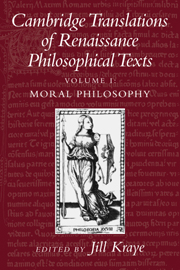Book contents
- Frontmatter
- Contents
- List of Translators
- Preface
- PART I CONCEPTS OF MAN
- 1 Anselm Turmeda
- 2 Poggio Bracciolini
- 3 Marsilio Ficino
- 4 Fernán Pérez de Oliva
- PART II ARISTOTELIAN ETHICS AND THE SUPREME GOOD
- PART III ARISTOTELIAN ETHICS AND CHRISTIANITY
- PART IV PLATONIC ETHICS
- PART V STOIC ETHICS
- PART VI EPICUREAN ETHICS
- Bibliography of Renaissance Moral Philosophy Texts Available in English
- Index Nominum
- Index Rerum
3 - Marsilio Ficino
Published online by Cambridge University Press: 05 June 2012
- Frontmatter
- Contents
- List of Translators
- Preface
- PART I CONCEPTS OF MAN
- 1 Anselm Turmeda
- 2 Poggio Bracciolini
- 3 Marsilio Ficino
- 4 Fernán Pérez de Oliva
- PART II ARISTOTELIAN ETHICS AND THE SUPREME GOOD
- PART III ARISTOTELIAN ETHICS AND CHRISTIANITY
- PART IV PLATONIC ETHICS
- PART V STOIC ETHICS
- PART VI EPICUREAN ETHICS
- Bibliography of Renaissance Moral Philosophy Texts Available in English
- Index Nominum
- Index Rerum
Summary
Introduction
The Florentine philosopher Marsilio Ficino (1433–99) was the most significant figure in the Renaissance revival of Platonism and Neoplatonism. He produced Latin translations of all Plato's dialogues (first published in 1484), making the complete corpus accessible to Western scholars for the first time. In addition, he translated a number of Greek Neoplatonic works, including the Enneads of Plotinus, as well as the group of writings attributed to Hermes Trismegistus. He wrote extensive commentaries on several of the Platonic dialogues, most notably the Symposium (1469), where he presented his influential theory of Platonic love as an attraction which moves from a physical to a spiritual plane, ultimately leading the lover to God. He was ordained a priest in 1473 and in the next year completed his Platonic Theology, which set out the Platonic arguments for the personal immortality of the soul (see also Chapter 13). Committed to the view that Plato's doctrines were essentially (though by no means completely) compatible with Christianity, he dedicated himself to the uphill task of placing Platonism, rather than Aristotelianism, at the centre of the philosophical curriculum. Aside from his philosophical and religious works, Ficino also wrote Three Books on Life (1489), a very popular treatise dealing with a wide range of medical, astrological and occult topics.
The theme of the two chapters from the Platonic Theology translated here is the role of man's rational soul as the vinculum mundi, the link which unites the universe, establishing a connection between the intelligible and material worlds.
- Type
- Chapter
- Information
- Cambridge Translations of Renaissance Philosophical TextsMoral and Political Philosophy, pp. 29 - 36Publisher: Cambridge University PressPrint publication year: 1997

